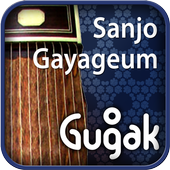
‘Gugak’ is a mobile application that let’s you play the traditional Korean musical instruments, such as Gayageum. Gugak uses real instrument sound and various tonal tuning settings, allowing you to experience the enthusiastic Korean music!
Gayageum is a typical Korean string instrument. Its origin is traced back to the period of three kingdoms, whose chronicles reported that Gaya’s King Kasil ordered a famous musician, Uruk, to create it. As the kingdom of Gaya dwindled in power, Uruk moved and brought the instrument to Silla. From there, it expanded as a popular musical instrument throughout Korean history—unified Silla, Goryeo Dynasty, and Jogeon Dynasty periods—and is still played today. The instrument can be classified into two types of genres: Jeong-ak (court music) and San-jo (folk music).
- Sanjo Gayageum -
This is a modern-style gayageum used to perform San-jo, a musical genre developed in the nineteenth century. The San-jo gayageum features brilliant, technical solos for performers, who employ a particular vibrato called Nong-Hyun and often play consecutive notes in fast and changeable tempi. To allow for such variations in expression, the size of the instrument is smaller and modified into a box-like shape. Unlike the Yang-Idu in the Jeong-ak Gayageum, the strings of this instrument are suspended on the tail side of the board, and they are called Bong-Mi, meaning a phoenix’s tail.
Enjoy Korean music with Sanjo Gayageum!
Development:
Center for Arts & Technologies Seoul National University(www.catsnu.com)
Developers:
Hyojee Kang, PyoungRyang Ko, Byongoh Ko, Daehyun Kim, Mijung Kim, Youngsun Kim, Taeeun Kim, Haeyun Kim, Sangbong Nam, Jisung Moon, Suchul Park, Jaerock Park, Jungho Bang, Yunjeong Seo, Hyangsook Song, Junseok An, Rina Yoo, So Jeong Youn, Gang Seong Lee, Donoung Lee, Doohyun Lee, Suzin Rhee, Sun-jin Lee, Kihyun Jung, Youngmi Cho, Jinok Cho
Support:
This work was financially supported by the Korea Creative Content Agency (KOCCA), an affiliate organization of the Ministry of Culture, Sports, and Tourism Korea (MCST), under the frame of the project KOCCA-2012-HE1405-R2012030134.
음정 변화없이 이동도법의 음이름만 변경함

![[콘서트 오늘] 송정민 - 카산드라 중 산조 가야금을 위한 제1섬(Cassandra No.1 Island for the Sanjo Gayageum) screenshot 2](https://i.ytimg.com/vi/0bqA0fJJuEo/mqdefault.jpg)
![[2021 Gugak in project music clip] #27 가현당 가야금스튜디오(GAHYEONDANG-Gayageum Studio) - 서공철류 가야금 산조 3중주 screenshot 3](https://i.ytimg.com/vi/ZJiSn6f44SI/mqdefault.jpg)
![[2023 Gugak in人] #18 박하영(Park Ha-young) - "백인영류 18현 가야금 산조 (18-string gayageum sanjo)" screenshot 4](https://i.ytimg.com/vi/DDy_vL86X58/mqdefault.jpg)
![[콘서트 오늘] 송정민 - 최옥삼류 가야금산조(Choi Oksamryu Gayageumsanjo) screenshot 5](https://i.ytimg.com/vi/EZXfL4YIyJw/mqdefault.jpg)